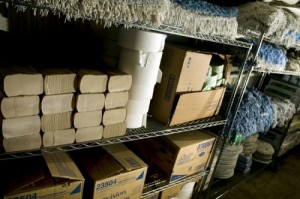VU supply chain has strong history of ‘buying green’
By Leslie Hast
[Originally published in The Reporter]
 In the last fiscal year, Procurement Services processed 452,000 transactions totaling more than $600 million for items ranging from cars and office furniture to toilet paper and floor cleaner.
In the last fiscal year, Procurement Services processed 452,000 transactions totaling more than $600 million for items ranging from cars and office furniture to toilet paper and floor cleaner.
With so many products making their way onto Vanderbilt’s campus every day, there are numerous opportunities to “go green” and choose the ones making the smallest environmental impact.
Chuck Nicholas, director of Procurement Services, said that although green purchasing has received more attention in recent years, it is a permanent part of the procurement mission.
“Environmental stewardship is not a fad, it’s not a trend. It’s just a good way of doing business. When you think about it, reducing waste is another way of increasing efficiency, and when you increase efficiency you save money,” he said. “Rather than take green stewardship and slap it on top of what we already do, we made it an integral part of our mission and the way we think about our relationships with our suppliers.”
When Procurement Services is deciding whether to do business with a company, one of their evaluation criteria is the company’s sustainability practices.
“We’re looking for environmentally friendly products and ones that are made from recycled materials, but we’re also drilling back deeper beyond what we’re ordering to how they practice environmental stewardship. Do they use recycled paper in their own processes? Do they use less packaging or have more efficient transportation?” explained Bob Peabody, sourcing officer.
Sourcing Officer Maggie Robinson has worked closely with Guy Brown, VU’s primary supplier of office products, to make items with recycled content more visible.
“In the last fiscal year, 7 percent of our spending with Guy Brown was with recycled products. We just recently redeployed the contract, and we asked them to put a symbol on their Web page for recycled products. We have at least 2,100 items that are recycled content within that individual contract,” Robinson said.
Procurement Services has requested that other primary suppliers also improve the visibility of green products in their catalogs.
Sourcing Officer Michael Jessing specializes in laboratory supply products and said that Fisher Scientific, VU’s primary supplier of lab products, has now created a catalog solely for green products which explains the benefits and offers tips for going green in the lab.
American Paper and Twine, VU’s primary janitorial products supplier, has done the same.
When purchasing green products, price can sometimes be a barrier.
“The unfortunate thing is some green products tend to be higher priced than the non-green products,” Jessing said. “That’s a constant struggle because everyone is looking to save money. But recently the cost difference has been reduced or is no longer an issue, which is really helpful.”
There is also the problem of “greenwashing,” when a manufacturer falsely claims a product is environmentally friendly.
Because there are no national standards on what qualifies a green product, Procurement Services relies on evidence from the manufacturer, their own research, and consultation with Andrea George, director of the Sustainability and Environmental Management Office.
“We have to understand that every product impacts the environment to some degree, so what we’re really talking about are degrees of impact. There is no zero-impact product,” Nicholas said.
“What we look for are industry and government standards, trade associations, our own analyses. This is where having knowledge of the various industries we deal with is valuable. We can challenge it and make our own assessments.”
Procurement Services also leads by example in green purchasing. Instead of stocking their break room with disposable plates and utensils, they purchased commercial-grade plates and flatware and installed a dishwasher.
This effort alone saves more than $300 per month and greatly reduces waste. They also print only when necessary, and then on both sides, and established an electronic system for their requisition paperwork.
“While it’s better to buy recycled paper than virgin paper, the best thing is not to print it in the first place if you don’t have to.
“Buying green products is good, but not using a product is best of all,” Nicholas said.
To find out more about green purchasing, visit the Procurement Services Web site.
The SustainVU Web site also offers event and departmental greening guides with helpful hints on how to reduce, reuse and recycle in the workplace and at home.

Leave a Response